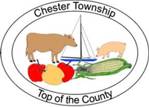|
|
 |
In 1854, Ananias J. Peugh settled the land, in the middle
of Section 32, where the village
of Conklin would be located. Oscar
F. Conklin, who later purchased the land, established a small settlement there. O.
F. Conklin built a small general store to serve the needs of the farmers rapidly settling in the area.
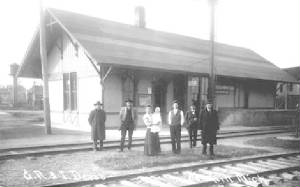
|
| G. R. & I. Depot |
When the Grand Rapids
and Indiana (GR & I) railroad began construction of a route from Grand Rapids
to Muskegon June 18, 1886,
Mr. Conklin convinced the railroad that the best route would pass through the southwest corner of Chester
Township. Mr. Conklin sold the right-of-way
through his land for $74.80 an acre and also convinced the railroad to build a depot on what had been his land. The West Chester Station was constructed. The first train
arrived at the station on December 1, 1886. In 1887, the railroad changed the name to Conklin Station. The rail line has since been abandonded and the depot demolished. The
railroad right-of-way is now the Musketawa Trail.
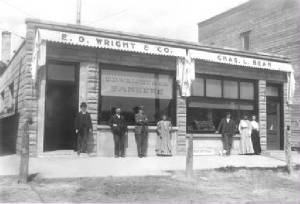
|
| Bank & Post Office |
Before the coming of
the railroad, the early settlers in this area had no direct mail service. Stage coaches delivered the mail to post offices along their routes - Six Corners and
Big Springs. In 1887, the year following the establishment of West Chester Station,
a post office opened there. Mr. Conklin made a trip to Washington, requesting that the post office be named Conklin. At
this time the community was called West Chester. Mr. Conklin’s request was granted
and the post office and the community became known as Conklin. Henry A. Miller
was the first postmaster.
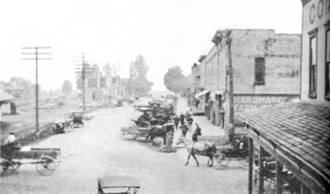
|
| Main Street looking south from the hotel |
During the next few years,
many more people settled in Conklin and the surrounding area. New businesses
were established to meet the needs of the farmers and others now living nearby. Some
of the businesses included a hotel, tavern, drug store, blacksmith shop, hardware and implement store, feed store, grist mill,
and lumber mill. Over the years, Conklin businesses included: attorney’s office, bank, barber shop, billiard hall, blacksmith’s shop, carpet &
paint store, clock & watch repair store, construction company, creamery, doctor’s office, drug store, dry goods
store, Ford car dealership, Ford tractor dealership, funeral parlor, furniture store, gas station, general store, grain elevator,
grist mill, grocery store, hardware store, hotel, insurance office, John Deere dealership, lumber yard, millinery shop, newspaper
office, real estate office, restaurant, saw mill, shoe store, and tavern.
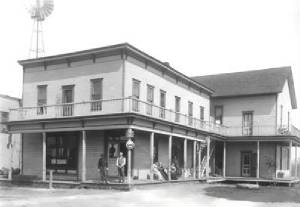
|
| Conklin House Hotel |
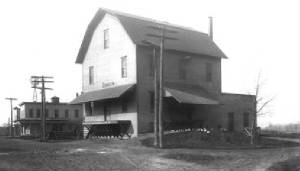
|
| Grist Mill |
|
 |
|
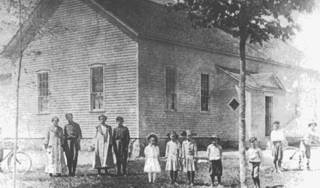
|
| Conklin School circa 1900 |
A school serving the residents of
the village and section soon opened, built on land northwest of the village. A
Congregational church was built in 1896. The fire department was organized by
the businessmen of Conklin in 1912. Pearl Arnold served as the first fire chief.
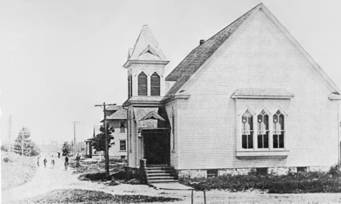
|
| Congregational Community Church, now Conklin Reformed Church |
IOOF (International Order of Odd Fellows) Industry Lodge #291 began in Lisbon and moved
to Conklin December 3, 1898. They
met in a hall owned by Norman Harris while they built their own hall. Construction
was started in June 1898 and was completed in time to hold a New Year’s dance, January
1, 1899. John Cazier was the first Noble Grand.
The Conklin Grange #1419 was formed on November
16, 1909. John Wilde, a member of the Ottawa County
Grange, from Herrington presided over the installation. The meetings were on
Saturdays at 1:00 p.m. The Grange Hall
was built by members in 1916. The first officers were: Master – Horace Merrick, Secretary – Kate T. Kelly, and Treasurer – Olen Devenport.
Telephone service arrived in the village
in 1905. The early phones were the crank type, ringing into a central
switchboard located in an office on the corner of Miller Street and the
ally behind Main street. The system was powered by batteries. All
of the phones were on a “party line” with telephones from three to as many as nine households sharing one line. Conversion of the Conklin exchange to dial telephones did not begin until April, 1958
and was completed late the next year. Electricity
did not reach the village until 1920.
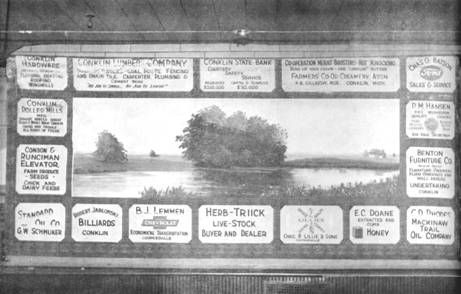
|
| The Stage Curtain in the Conklin Grange Hall |
|
 |
|
|
 |
|
|
 |
|
|
|
|
Chester Township
Ottawa County
Michigan, USA
|
|
|
 |
